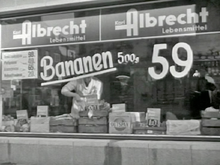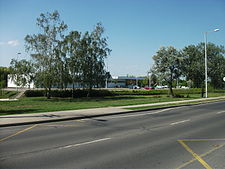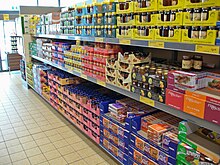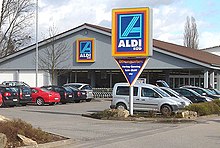Aldi
This article's tone or style may not reflect the encyclopedic tone used on Wikipedia. (August 2012) |
| File:Aldi-Nord Logo.svgFile:Aldi-sued-logo.svg | |
| Company type | Private |
|---|---|
| Industry | Retail |
| Founded | 1913 (split into Aldi Nord and Aldi Süd in 1960) |
| Founder | Karl Albrecht Theo Albrecht |
| Headquarters | Essen, Germany (Aldi Nord) Mülheim an der Ruhr, Germany (Aldi Süd) |
Number of locations | 9,221 |
Area served | Global |
Key people | Matthew Barnes (CEO, UK Operations)[1] |
| Products | Discount store, Supermarket |
| Revenue | |
| Website | aldi.com |
ALDI Einkauf GmbH & Co. oHG, doing business as (German pronunciation: [aldiː]), short for "Albrecht Discount", is a global discount supermarket chain based in Germany.
The chain is made up of two separate groups, ALDI Nord (North - operating as ALDI MARKT), with its headquarters in Essen,[3] and ALDI Süd (South - operating as Aldi Süd), with its headquarters in Mülheim an der Ruhr,[4] which operate independently from each other within specific areas.
The individual groups were originally owned and managed by brothers Karl Albrecht and Theo Albrecht; Karl Albrecht retains ownership of Aldi Süd, and with a personal wealth of €17.2 billion, is the richest man in Germany, while the co-owners of Aldi Nord, Berthold and Theo Albrecht Jr., follow close behind at €16 billion. Dieter Schwarz, owner of Lidl and Kaufland came in third, with a fortune of €11.5 billion.[5] Theo Albrecht was Germany's second-wealthiest person at his death in July 2010.[citation needed]
Aldi's German operations consist of Aldi Nord's 35 individual regional companies with about 2,500 stores in western, northern, and eastern Germany, and Aldi Süd's 31 regional companies with 1,600 stores in western and southern Germany. Internationally, Aldi Nord operates in Denmark, France, the Benelux countries, the Iberian peninsula, and Poland, while Aldi Süd operates in the United States, Ireland, the United Kingdom, Hungary, Switzerland, Austria, Slovenia, and Australia. In Austria and Slovenia, Aldi Süd operates as Hofer. In the U.S., Aldi Süd operates as Aldi, while Aldi Nord owns the Trader Joe's chain.
According to a 2002 survey conducted by the German market research institute Forsa, 95% of blue-collar workers, 88% of white-collar workers, 84% of public servants, and 80% of self-employed Germans shop at Aldi.[6] One of Aldi's direct competitors, both nationally and internationally, is Lidl.
History


The earliest roots of the company trace back to 1913, when the mother of Karl and Theo Albrecht opened a small store in a suburb of Essen. Their father was employed as a miner and later as a baker’s assistant. Karl Albrecht was born in 1920, Theo Albrecht in 1922. Theo Albrecht completed an apprenticeship in his mother’s store, while Karl Albrecht worked in a delicatessen. Karl Albrecht took over a food shop formerly run by F. W. Judt who already advertised to be the "cheapest food source". Karl Albrecht served in the German Army during World War II. In 1946, the brothers took over their mother’s business and soon opened another retail outlet nearby. By 1950, the Albrecht brothers owned 13 stores in the Ruhr Valley. The brothers' idea, which was new at the time, was to subtract the legal maximum rebate of 3% before sale. The market leaders at the time, which often were co-operatives, required their customers to collect rebate stamps, and to send them at regular intervals to reclaim their money. The Albrecht brothers also rigorously removed merchandise that did not sell from their shelves, cutting costs by neither advertising nor selling fresh produce, and keeping the size of their retail outlets small.
When the brothers split the company in 1960 over a dispute whether they should sell cigarettes at the till, they owned 300 shops with a cash flow of DM90 million yearly. In 1962, they introduced the name Aldi—short for Albrecht-Diskount. Aldi Nord and Aldi Süd have been financially and legally separate since 1966, although both divisions' names may appear (as if they were a single enterprise) with certain house brands or when negotiating with contractor companies.
Aldi expanded internationally in the 1970s and 1980s, experiencing a rapid expansion after German reunification and the fall of the Iron Curtain. The brothers retired as CEOs in 1993 and gave most of their wealth to foundations.[citation needed]
Business organization
Germany
The Aldi Nord group currently consists of 35 independent regional branches with approximately 2,500 stores. Aldi Süd is made up of 31 companies with 1,600 stores. The border between their territories runs from the Rhine via Mülheim an der Ruhr, Wermelskirchen, Marburg, Siegen, and Gießen east to just north of Fulda. The former East Germany is served by Aldi Nord, except for one Aldi Süd in Sonneberg, Thuringia, whose regional office is in Bavaria. The regional branches are organised as limited partnerships with a regional manager for each branch who reports directly to the head office in Essen (Aldi Nord) or Mülheim an der Ruhr (Aldi Süd). The regional distribution centres usually are away from urban areas, but always near an autobahn to facilitate transporting merchandise to individual stores. Aldi Nord has distribution centres in Bargteheide, Barleben, Beucha, Beverstedt, Datteln, Essen, Greven, Hann. Münden, Hemmoor, Hesel, Herten, Horst, Hoyerswerda, Jarmen, Lehrte, Lingen, Minden, Nortorf, Radevormwald, Rinteln, Salzgitter, Scharbeutz, Schloß Holte, Schwelm, Werl, and Weyhe; the latter also is the coffee roaster of Aldi Nord.
Internationally
The Aldi group operates over 8,000 stores worldwide. A store opens roughly every week in Britain alone.[7]
Aldi Nord is responsible for its stores in Belgium, the Netherlands, Luxembourg, France, Spain, Denmark, and Portugal. Aldi Süd's responsibilities are in the USA, Austria, the United Kingdom, Ireland, Australia, Switzerland, and Slovenia. Aldi Süd's first Switzerland store opened in 2005, while it has operated in Hungary and Poland since 2007. Aldi Süd had invested an estimated €800m ($1bn; £670m) in Greece from November 2008 until pulling out on 31 December 2010.[8]
Whilst Aldi Nord has renamed its Dutch and Belgian subsidiaries Combi and Lansa to the ALDI Markt/Aldi Marché brand, Aldi Süd tries to maintain a regional appearance, branding its stores Aldi Süd in Germany, Aldi Suisse in Switzerland, and Hofer in Austria and Slovenia.
While Aldi has less than 3% of overall UK grocery sales, its importance there (along with that of Continental no-frills competitor Lidl) is growing. Aldi has been aggressively recruiting management staff at top UK universities.
In the USA, as with most American supermarkets, Aldi accepts public assistance debit-style cards as payment.

In much of Australia, Aldi filled a void in the discount supermarket business that arose when the discount grocery chain Franklins, in 2002, became limited to New South Wales. On 17 December 2008, Aldi opened its 200th Australian store; its supermarkets are in Victoria, New South Wales, the Australian Capital Territory, and Queensland.[9]
Geographic distribution


| Country | Name | Aldi group | Since | Outlets |
|---|---|---|---|---|
| Aldi | Nord | 1946 | 2,400 | |
| Aldi | Süd | 1946 | 1,790[10] | |
| Aldi | Süd | 2001 | 277[11] | |
| Hofer | Süd | 1968 | 430[10] | |
| Aldi | Nord | 1973 | 380 | |
| Aldi | Nord | 1977 | 244 | |
| Aldi | Nord | 1988 | 680 | |
| Aldi | Süd | 2008 | 85 [12] | |
| Aldi | Süd | 1998 | 97 | |
| Aldi | Nord | 1990 | 12 | |
| Aldi | Nord | 1975 | 406 | |
| Aldi | Nord | 2008 | 72 | |
| Aldi | Nord | 2006 | 29 | |
| Hofer | Süd | 2005 | 60[10] | |
| Aldi | Nord | 2002 | 227 [13] | |
| Aldi Suisse | Süd | 2005 | 130[10] | |
| Aldi | Süd | 1989 | 421[14][15] | |
| Aldi | Süd | 1976 | 1,140[10] | |
| Aldi | Nord | 1979 | 355 | |
| total number of Aldi Nord stores | 4,805 | |||
| total number of Aldi Süd stores | 4,430 | |||
| combined total of Aldi stores | 9,235 | |||
Business practices
Note: Store hours are given in 24-hour time.
Some Aldi practices are common in German supermarkets but largely unique to Aldi in other countries. These include the system of metal gates and turnstiles forcing customers to exit through the checkout, and charging customers for shopping bags. Until 2004, Aldi stores accepted only cash (since then, German stores have accepted domestic Girocard debit cards). Debit cards also are accepted in the USA, the UK, Austria, Belgium, Denmark, France, Portugal, Spain, the Netherlands, Switzerland, Ireland, Australia, Slovenia, and Hungary.
Aldi generally does not accept credit cards, though Aldi Australia accepts MasterCard and Visa for a 0.5% surcharge. In the USA, Aldi unsuccessfully experimented with accepting Discover Card and Visa.
Another practice at Aldi stores in Europe, Australia, and the USA, is requiring a coin, or an Aldi-issued reusable token, to use a shopping trolley. When the coin or token is inserted, the trolley is unlocked from the other trolleys. When the cart is returned, the customer is refunded their coin, effectively costing the customer only the time to return the cart. By contrast, other American stores often have employees return carts left in parking areas.
Almost all Aldi's German shops are open until 20:00 from Monday to Saturday. Aldi's USA shops open at 9:00 or 10:00, and close at 21:00 (20:00 on Sundays). UK Aldi shops close at 19:00, 20:00 or 21:00 except on Sundays in England and Wales, where Sunday trading law limit them to six hours, and they open from 10:00 to 16:00. Aldi shops in Australia generally open from 08:30-20:00 most weekdays, closing on Thursdays at 21:00, and weekends at 19:00; these shops open on Sundays where permitted. Irish Aldi stores are open 9:00-20:00 Monday, Tuesday, Wednesday, and Saturday; 9:00-21:00 Thursdays and Fridays, and 10:00-19:00 Sunday.
In-store layout


Aldi specialises in staple items, such as food, beverages, toilet paper, sanitary articles, and other inexpensive household items. Many of its products are own brands, with the number of other brands usually limited to a maximum of two for a given item. This increases sales for each article, and allows Aldi shops to be smaller than those which have more brand choice. This practice allowed Aldi to avoid using price tags even before the introduction of bar code scanners (see below).
Branded products carried include HARIBO in Germany, Marmite and Branston Pickle in the UK; and Vegemite and Milo in Australia. In the USA, major brand-name products, such as Oscar Mayer bacon, sometimes are offered as a 'special purchase': name-brand items that Aldi has received at a special price from the vendor and can offer for a reduced price. Unlike most shops, Aldi does not accept manufacturers' coupons, although some USA stores successfully experimented with store coupons (e.g. $10 off a $25 purchase).
In addition to its standard assortment, Aldi has weekly special offers, some of them on more expensive products such as electronics, tools, appliances, or computers, usually from Medion. Discount items can include clothing, toys, flowers, and gifts. Specials have strict limits on quantities, and are for one week. Aldi's early computer offers in Germany (such as a Commodore 64 pack in 1987) resulted in those products selling out in a few hours.[16]
Aldi is the largest wine retailer in Germany[17] some Australian stores now sell alcoholic beverages. Aldi mainly sells exclusively produced, custom-branded products (often identical to and produced by major brands[18]) with brand names including "Grandessa" and "Fit & Active". USA, Australian, and UK Aldi stores also feature bargain-priced, gourmet foods imported from Germany.
Aldi's gift certificates must be paid for in cash.
Low price policy
This section possibly contains original research. (September 2010) |



Aldi's "strictly no frills" approach means that its shops do not decorate aisles or fill shelves: pallets of each products (in cardboard boxes, shaped so customers can easily pick them up) are placed alongside the aisles; customers retrieving them gradually empty the boxes (since Aldi charges for bags, its empty cardboard boxes are often removed by customers and used as "shopping bags"). After a pallet has been emptied, it is replaced. Multi-tiered shelves are utilized in many shops, sporting identifiable cases of product. Long queues at the checkout are common, reflecting Aldi's minimal staffing levels, as well as the competitive nature of the German retail trade, where long till queues are accepted as part of daily life.[clarification needed] However, because of Aldi's checkout system, a long queue does not necessarily reflect longer waiting times than in other stores. In Ireland and the UK, Aldi operates a "one-past-the-belt" system; when a customer waits beyond the end of a staffed conveyor belt, another till is opened. Employees are expected to work both at checking customers out and at maintenance, often doing both during busier times. Conversely, when customer traffic is low, only one employee will be at the checkout, while others perform different tasks, including stocking and cleaning. Aldi has carved a niche with this approach; while some patrons may not like shopping in a bland or industrial-looking (and possibly congested) shop, such a lack of frills has become the norm with Aldi. "Top quality at incredibly low prices", "smarter shopping", and "Spend a little, live a lot" are Aldi's slogans.
Aldi also profited from the introduction of the Euro. In contrast to other supermarkets, Aldi prominently listed "before and after" prices ("before" prices in the local currency) on posters in its stores for months after the 2002 introduction of the euro, generally "reducing" prices versus the outgoing currency.
Advertising policy
Aldi has a policy in Germany of not advertising, apart from a weekly newsletter of special prices called "Aldi informs" that is distributed in stores and by direct mail, and often printed in local newspapers. It claims this is a cost saving that can be passed on to consumers. However, in the USA it advertises in newspapers and on television. In the UK, print and television ads have appeared since mid-2005. In Germany, Aldi has never used an external advertising agency.[6]
Checkout system

Aldi's checkout procedure is highly standardised, with checkout operators sitting in swivel chairs, passing products through a two-sided barcode scanner. Some products have several identical barcodes, on different sides of the packaging, to speed this procedure. As products can be scanned multiple times due to the "extra" barcodes, there is a "one-second delay", meaning the same barcode cannot be scanned twice within one second. A cashier must scan a minimum number of items per hour (depending on store traffic.) If there are no customers in line, the cashier switches the till to "standby", effectively 'stopping the clock' until the next customer approaches. Aldi does not have publicly listed telephones in stores to minimize the time tills are unused.
Aldi, a latecomer to bar code scanners, did not add them until 2004; previously, cashier clerks manually entered a three-digit code for each item from memory (Aldi Nord) or the actual price (Aldi Süd.) This practice is still used somewhat in the UK, USA, and Ireland, with staff needing to memorise about 100 fruit and vegetable product numbers. One advantage is the cashiers can type in the prices of articles on the conveyor belt.
Once products have been scanned, they are put back in the shopping cart, which has a special dock on the counter for this purpose. This is why management at German Aldi stores insist that customers use a trolley; customers are expected to bag groceries away from the cash-desk. In most countries, Aldi does not offer hand baskets. In Denmark and the UK, however, hand baskets are available in all Aldi stores, while some Australian Aldi stores provide them.
In most of Europe, and in the USA and Australia, Aldi does not provide free plastic shopping bags. Customers can purchase plastic reusable bags at the checkout to carry good from the store. Aldi encourages customers to bring their own bags. Many customers use empty boxes from pallets for packaging their groceries.
Reputation

Originally Aldi shops were often ridiculed as being cheap shops selling low-quality goods, whose customers could not afford to shop elsewhere.[19] However, being held in low esteem by many did not seem to dent Aldi's profits. Gradually, German consumers discovered that the poor reputation of Aldi's products was not deserved.[20] This shift in public perception was boosted by cookbooks that used only Aldi ingredients, which led to the emergence of Aldi fandom. This can be seen by books like Aldidente with recipes containing only ingredients found at Aldi, as well as the German-language newsgroup de.alt.fan.aldi. In the UK, Aldi has become known for its low prices. More recent advertising claiming that most UK customers prefer Aldi's non-branded products to more-expensive branded products has also changed the country's perception of the company.
A book on world-class retailers[21] suggests that Aldi's and Costco make an effort to ensure that their own label products are viewed as equal to, if not better than, leading branded products, and that WalMart abandoned Germany when they could not compete with Aldi.
Criticism
In April 2000, Aldi UK paid damages to a shop manager who was fired for being HIV-positive. Aldi reached an out-of-court settlement with Mark Hedley (who had been manager of the Aldi supermarket in Seaham, County Durham) shortly before an employment tribunal hearing. Hedley complained of discrimination after he was asked to leave because bosses said staff were uncomfortable around him. It is thought the damages paid to Hedley were "six figures".[22]
In 2004, German Aldi stores sold garden furniture made of Indonesian Meranti wood. Because it was not able to show that it was sourced legally (70% of Indonesian timber is illegally logged), environmental organisations pressured Aldi to stop selling the furniture.[23] Within days Aldi announced that all of the timber used in its products would bear the FSC certificate, which promotes sustainable forestry.[24]
In 2008 Aldi UK demolished an historic coaching inn in Burpham having previously agreed not to until planning consent had been received[citation needed].
In 2010, over 200 Aldi store managers in the USA filed charges over unfair labour practices, claiming they were illegally classified as exempt from overtime pay, receiving a fixed salary regardless of the actual number of hours worked. The plaintiffs claimed that instead of managing, most of the time was spent stocking shelves, cleaning spills, and serving customers. Aldi store managers are not responsible for hiring, firing, or promoting employees.[25] The Fair Labor Standards Act, one of the major labor laws in the United States, and the law that (among many other things) mandates overtime pay, is not required to be applied to supervisors (which it defines as employees with the ability to hire, fire, or promote employees).
In September 2011, Australian community groups in Quakers Hill, New South Wales launched objections over Aldi's plans of selling discount alcohol at several stores.[26]
In 2013 Aldi was criticized for spying on its own staff.[27]
Aldi Talk
Aldi also has a mobile virtual network operator in Germany, Belgium, and the Netherlands, called Aldi Talk.
References
- ^ http://www.thegrocer.co.uk/companies/joint-chiefs-take-over-at-aldi-uk/207589.article
- ^ "Obituary: Theo Albrecht."
- ^ "Impressum." Aldi Nord. Retrieved on February 14, 2011. "ALDI Einkauf GmbH & Co. oHG Eckenbergstraße 16 45307 Essen."
- ^ "Impressum." Aldi Süd. Retrieved on February 14, 2011. "Burgstraße 37 45476 Mülheim an der Ruhr Amtsgericht Duisburg HRA 8577."
- ^ <a href="http://www.thelocal.de/money/20111010-38121.html">Aldi dynasty continue to lead German rich list</a>.Published: 10 Oct 11 15:32 CET
- ^ a b Steinhoff, Jürgen (2002-12-16). "Hinter den Kulissen des Discounters". Stern (in German). Retrieved 2010-08-04.
{{cite web}}: Unknown parameter|coauthors=ignored (|author=suggested) (help) - ^ Wallop, Harry (30 Jun 2008). "Aldi pledges to open a new store every week". London: The Telegraph. Retrieved 18 February 2012.
- ^ "Aldi quits Greece" (in German). www.german-retail-blog.com. July 23, 2010. Retrieved 18 February 2012.
- ^ Aldi opens five new Queensland stores > FOODweek Online > Main Features Page [dead link]
- ^ a b c d e "Aldi Süd Facts and Figures". Archived from the original on 22 December 2008. Retrieved 2008-12-06.
{{cite web}}: Unknown parameter|deadurl=ignored (|url-status=suggested) (help) - ^ Speedy, Blair (April 18, 2012). "Shoppers snap up Aldi's weekly 'special buys'". The Australian. Retrieved August 5, 2012.
- ^ "ALDI stores in Hungary".[failed verification]
- ^ "Los Supermercados ALDI más próximos". Retrieved 2010-12-30.[failed verification]
- ^ "Pinch helps discount supermarkets". BBC News. 2008-11-20. Archived from the original on 19 December 2008. Retrieved 2008-12-06.
{{cite news}}: Unknown parameter|deadurl=ignored (|url-status=suggested) (help)[failed verification] - ^ "?".[failed verification]
- ^ "HCM: The Home Computer Museum". Retrieved 2007-02-09.
- ^ "GERMANY: Aldi is the biggest wine retailer in Germany". Progressive Newsletter 79. Progressive Group International Newsletter. 20–26 March 2006. Retrieved 18 February 2012.;
- ^ A list of no-name brands and the major brand companies behind them for Germany. Aldi relies on re-labeled major brand products.
- ^ Waltraud Schwab (19.06.2010). "Arme Discounterkunden: Kasse dank Masse" (in German). Die Tageszeitung.
{{cite web}}:|access-date=requires|url=(help); Check date values in:|date=(help); Missing or empty|url=(help); Unknown parameter|urhttp://en.wikipedia.org/w/index.php?title=ignored (help) - ^ "Aldi Stores as Culture". www.h2g2.com. 4 August 2000. Retrieved 18 February 2012.
- ^ Competing in Tough Times: Business Lessons from L.L.Bean, Trader Joe's, Costco, and Other World-Class Retailers, FT Press, ISBN 978-0132459198
- ^ "Damages for sacked HIV manager". BBC News. 2000-04-10. Retrieved 2007-01-14.
- ^ Template:De icon "Umwelt:Aldi auf dem Holzweg". Spiegel Online. 2004-05-20. Retrieved 2007-02-04. [dead link]
- ^ Template:De icon "Protestaktionen bringen Discounter zum Umdenken". 2004-05-26. Retrieved 2007-02-04. [dead link]
- ^ Cho, Janet (January 20, 2010). "Aldi grocery store employees accuse chain of violating federal wage laws". http://www.cleveland.com. Retrieved 18 February 2012.
{{cite web}}: External link in|publisher= - ^ "Aldi to sell alcohol".
- ^ http://www.thelocal.de/society/20130107-47165.html#.UOqJ2HfoD4Y
External links
Company sites
- Aldi International (with links to all of Aldi's international websites)
- Aldi Careers (Aldi's US careers website)
Non-Aldi sites
- Yahoo! - ALDI Group Company Profile
- Aldi Product Review Customer discussions about Aldi products. Focuses mainly on stores and products in the United States.
- Aldi opens in Dallas with big hopes, small stores - Dallas Morning News, March 18, 2010
- Companies established in 1913
- Discount stores of the United States
- German brands
- No frills
- Supermarkets of Australia
- Supermarkets of Belgium
- Supermarkets of Denmark
- Supermarkets of France
- Supermarkets of Germany
- Supermarkets of the Netherlands
- Supermarkets of Poland
- Supermarkets of Portugal
- Supermarkets of Switzerland
- Supermarkets of the United States
- Supermarkets of the United Kingdom
- Supermarkets of Spain
- Companies based in North Rhine-Westphalia
- Supermarkets of Slovenia
- 1913 establishments in Germany
